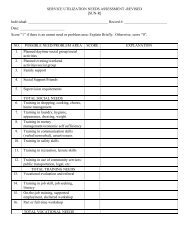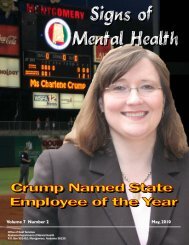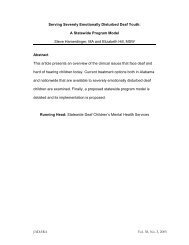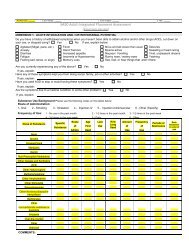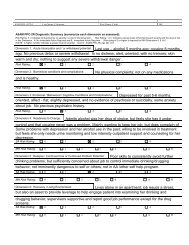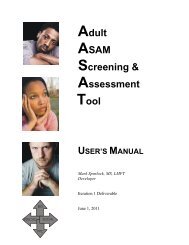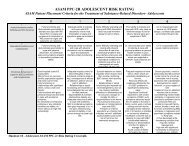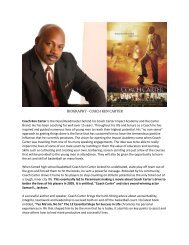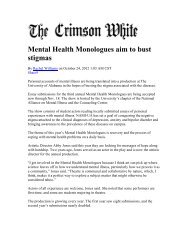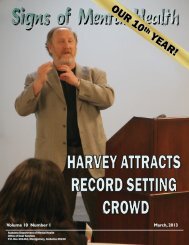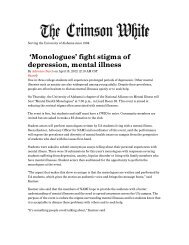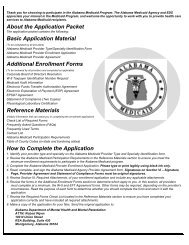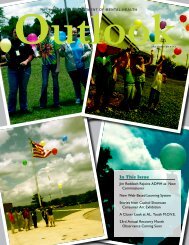Volume 8 Number 4 December, 2011 - Alabama Department of ...
Volume 8 Number 4 December, 2011 - Alabama Department of ...
Volume 8 Number 4 December, 2011 - Alabama Department of ...
You also want an ePaper? Increase the reach of your titles
YUMPU automatically turns print PDFs into web optimized ePapers that Google loves.
On The ODS Book Shelf<br />
(Continued from page 10)<br />
tal disorders in the prelingually deaf population is<br />
scarce. In 1999, an extensive literature review was<br />
published, containing prevalence studies published<br />
prior to 1994. A systematic search was made for<br />
research publications about the prevalence and<br />
distribution <strong>of</strong> psychiatric symptoms and disorders<br />
published between 1995 and <strong>2011</strong>. Eleven studies<br />
were found, five with samples from the general<br />
population and six with clinical samples. Since<br />
1999, studies <strong>of</strong> deaf individuals have improved<br />
methodically, especially with regard to assessment<br />
procedures and instruments. However, selection<br />
bias, lack <strong>of</strong> representative samples, and unmatched<br />
comparison samples still preclude firm<br />
conclusions on the prevalence and distribution <strong>of</strong><br />
psychiatric symptoms and disorders in the prelingually<br />
deaf population. This means that in order to<br />
gain a better understanding <strong>of</strong> the impact <strong>of</strong> prelingual<br />
deafness on mental health, studies with more<br />
representative samples and better matched samples<br />
in comparisons are needed.<br />
Schwenke, Tomina. <strong>2011</strong>. Childhood trauma: considering<br />
diagnostic and culturally sensitive treatment approaches for<br />
deaf clients. JADARA 45. 158 – 173<br />
The existing research acknowledges that in comparison<br />
to hearing individuals, deaf children are<br />
exposed to interpersonal trauma at greater rates <strong>of</strong><br />
prevalence. Furthermore, significant behavioral<br />
and emotional problems have been associated with<br />
the experience <strong>of</strong> abuse for deaf and hard-<strong>of</strong>hearing<br />
children, including symptoms <strong>of</strong> PTSD, anxiety<br />
and depression.<br />
SERID Conference A Hit In <strong>Alabama</strong><br />
(Continued from page 7)<br />
development and Training Specialist at the Helen Keller<br />
National Center, Art Roehrig, also Deaf-Blind and Dr. Byron<br />
Bridges, Troy University Interpreter Training Program.<br />
ODS Director Steve Hamerdinger teamed with Michelle<br />
Niehaus, Program Administrator / Statewide Coordinator for<br />
Deaf Services at KY Division <strong>of</strong> Mental Health, Developmental<br />
Disabilities, & Addiction Services, and Charlene Crump,<br />
Statewide Mental Health Interpreter Coordinator for the<br />
Office <strong>of</strong> Deaf Services to present a well attended session on<br />
Etiology and Language Deprivation. Niehaus also presented<br />
on Peer Support Services.<br />
It wasn’t all work, <strong>of</strong> course. Shannon Reese, Service<br />
Coordinator for ODS, was a Mistress <strong>of</strong> Ceremony for the<br />
Awards night. As it happened, two people intimately<br />
associated with ODS were honored; former ADMH<br />
Commissioner John Houston and Region II Interpreter Sereta<br />
Campbell (See sidebar)<br />
SERID was founded for the purpose <strong>of</strong> provid[ing]<br />
educational and pr<strong>of</strong>essional development for individuals<br />
who work with consumers who are deaf, hard <strong>of</strong> hearing,<br />
deaf-blind, and late-deafened. The goal <strong>of</strong> this conference is<br />
to promote collaboration between service providers and<br />
communities serving these consumers within the region. It<br />
also provides an avenue for recruiting new staff for vacant<br />
positions as well as a way for rewarding current staff for the<br />
good work they are doing. (see http://serid.org/about.html)<br />
The 2012 SERID conference is scheduled to be in<br />
Chattanooga, Tennessee October 18-19, 2012. <br />
Current Qualified Mental Health Interpreters<br />
Becoming a Qualified Mental Health Interpreter in <strong>Alabama</strong> requires a rigorous course <strong>of</strong> study, practice, and examination that takes<br />
most people nearly a year to complete. It involves 40 hours <strong>of</strong> classroom time, 40 hours <strong>of</strong> supervised practica and a comprehensive<br />
examination covering all aspects <strong>of</strong> mental health interpreting.<br />
Charlene Crump, Montgomery<br />
Denise Zander, Wisconsin<br />
Nancy Hayes, Remlap<br />
Brian McKenny, Montgomery<br />
Dee Johnston, Talladega<br />
Debra Walker, Georgia<br />
Lisa Gould, Mobile<br />
Gail Schenfisch, Wyoming<br />
Dawn Vanzo, Huntsville<br />
Wendy Darling, Prattville<br />
Pat Smartt, Sterrett<br />
Lee Stoutamire, Mobile<br />
Frances Smallwood, Huntsville<br />
Cindy Camp, Piedmont<br />
Lynn Nakamoto, Hawaii<br />
Roz Kia, Hawaii<br />
Jamie Garrison, Wisconsin<br />
Vanessa Less, Wisconsin<br />
Kathleen Lamb, Wisconsin<br />
Dawn Ruthe, Wisconsin<br />
Paula Van Tyle, Kansas<br />
Joy Thompson, Ohio<br />
Judith Gilliam, Talladega<br />
Stacy Lawrence, Florida<br />
Sandy Peplinski, Wisconsin<br />
Katherine Block, Wisconsin<br />
Steve Smart, Wisconsin<br />
Stephanie Kerkvliet, Wisconsin<br />
Nicole Kulick, South Carolina<br />
Rocky DeBuano, Arizona<br />
Janet Whitlock, Georgia<br />
Sereta Campbell, Tuscaloosa<br />
Thai Morris, Georgia<br />
Lynne Lumsden, Washington<br />
Tim Mumm, Wisconsin<br />
Patrick Galasso, Vermont<br />
Kendra Keller, California<br />
June Walatkiewicz, Michigan<br />
Teresa Powers, Colorado<br />
Melanie Blechl, Wisconsin



